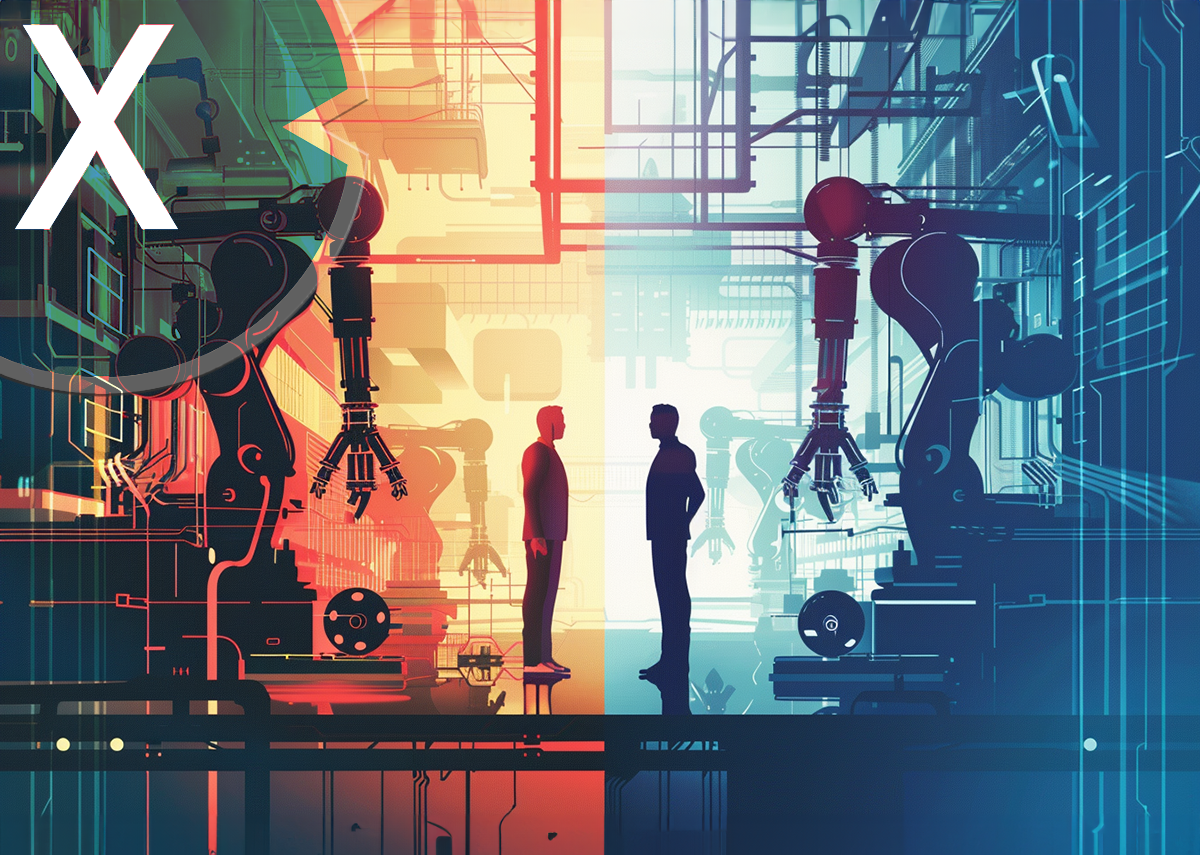
Artificial intelligence in the company – in-house development or ready-made solution? – Image: Xpert.Digital
🤖 The role of AI in the modern corporate world: Tailor-made or standard?
📊 Data as a decisive competitive factor
The integration of artificial intelligence (AI) into operational processes is increasingly becoming a decisive competitive factor. But many companies are faced with the question: Do I have to develop a tailor-made AI model to achieve specific company goals, or are there already universal AI models that can be used directly?
There is no general answer to this question because it depends heavily on the area of application. In many cases, ready-made AI solutions, such as for standard applications in data analysis or language processing, offer a quick and cost-effective start. Particularly in areas such as customer support or marketing, proven AI models have already been established that work reliably and efficiently thanks to pre-trained algorithms.
However, standardized solutions reach their limits when it comes to highly specific company needs. Take logistics, for example: Here, tailored AI models based on a company's individual processes, data and requirements can offer significant added value. A standard model may not be able to account for the intricacies of operational processes, seasonal fluctuations, or industry-specific challenges.
Suitable for:
📈 Data as the key to AI implementation
Developing your own AI model requires that the company provides the right data. Because AI models become more powerful through training with extensive data sets. This data must come from internal systems, processes and possibly external sources. Companies should be clear about what data is available and whether it is of sufficient quality to reliably train an AI model.
A common example is the full automation of logistics. The AI model must not only know historical data about delivery times, inventory levels and shipping routes, but also be able to react in real time to unforeseen events such as delivery bottlenecks or delays. Companies therefore have to collect and process data from various sources – such as merchandise management systems, traffic information and customer databases.
To use this data, companies often need to invest in modern data systems that make it possible to collect, analyze and use this information to train an AI model. The better the data quality, the more precise and powerful the AI becomes.
🚚 Use of AI language models in logistics
Another point is the use of AI language models for specific applications, such as in logistics. Can an AI language model really help automate logistical processes? The answer is: yes, but only in certain contexts.
Language models such as GPT can be used to understand and generate natural language, which is particularly useful in the field of communication. In logistics, for example, language models could help to automatically answer customer inquiries or efficiently create reports on inventories and deliveries. However, actual process automation, such as controlling transport routes or optimizing inventory levels, requires specialized algorithms based on other types of data models.
The mistake that is often made is to believe that a language model like GPT can take over all tasks in the company. Language models are excellent at handling text-based tasks, but are not suitable for autonomously controlling highly complex logistical processes. This requires additional AI models that are specifically designed for process optimization, machine learning and predictive analysis.
🔍 Important considerations for businesses
When deciding whether a customized AI model or an off-the-shelf solution is the better choice, companies must consider various factors. First: How complex are the company processes and what requirements are there? Second, is sufficient and high-quality data available to train a model? Third: Which AI solutions are already on the market that may already cover the specific requirements?
There are a growing number of AI providers offering specialized solutions for various industries. These pre-trained models can often form a solid basis that can be adapted to your own company through fine adjustments and additional data. This saves time and costs compared to developing a completely new AI model.
However, companies should also consider the long-term impact of such a decision. A tailored AI model can usually better respond to individual needs and often offers greater flexibility as it can be continuously developed and adapted to new conditions. On the other hand, developing and maintaining such a model requires significant resources – both financial and in terms of expertise.
Suitable for:
🏁 The right AI strategy for your company
For many companies, the introduction of artificial intelligence represents a significant opportunity to gain a competitive advantage in an increasingly digital and data-driven world. But the question of whether a tailor-made AI model or a ready-made solution is the better choice depends on many factors.
In areas such as logistics, where automating processes is a priority, specialized AI models based on company-specific data can bring significant efficiency improvements and cost savings. In other areas, such as customer communication, ready-made language models can already cover a large part of the requirements.
In the end, it is important to make an informed decision based on a solid analysis of your own company processes, the available data and the long-term company strategy. Companies that want to fully exploit the benefits of artificial intelligence should not ignore the possibilities of a tailor-made solution, but should also carefully examine the solutions already available on the market.
Suitable for:
📣 Similar topics
- 💡 Tailored AI in the company: opportunities and challenges
- 🚀 Advantages and disadvantages of pre-built AI models in everyday business
- 🔍 Why data quality is crucial for AI solutions
- 🏢 Use of AI in logistics: standard solution vs. customized model
- 🤖 Language models in logistics: What works and what doesn't?
- ✨ Decision guide: Tailor-made AI model or standard solution?
#️⃣ Hashtags: #ArtificialIntelligence #BusinessProcesses #Logistics #DataQuality #LanguageModels
We are there for you - advice - planning - implementation - project management
☑️ SME support in strategy, consulting, planning and implementation
☑️ Creation or realignment of the digital strategy and digitalization
☑️ Expansion and optimization of international sales processes
☑️ Global & Digital B2B trading platforms
☑️ Pioneer Business Development
I would be happy to serve as your personal advisor.
You can contact me by filling out the contact form below or simply call me on +49 89 89 674 804 (Munich) .
I'm looking forward to our joint project.
Xpert.Digital - Konrad Wolfenstein
Xpert.Digital is a hub for industry with a focus on digitalization, mechanical engineering, logistics/intralogistics and photovoltaics.
With our 360° business development solution, we support well-known companies from new business to after sales.
Market intelligence, smarketing, marketing automation, content development, PR, mail campaigns, personalized social media and lead nurturing are part of our digital tools.
You can find out more at: www.xpert.digital - www.xpert.solar - www.xpert.plus

